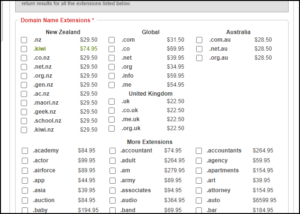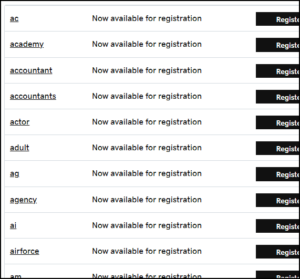Did you know that there are now 500+ domain name extensions?
More are released every year.
Here is 1stdomains.nz list of domain name extensions:

Here is the Godaddy.com list of domain name extensions

I use the phrase “Domain Name Extension” to refer to the part after the final dot in a domain name, but the technical term is a “TLD” which stands for “Top Level Domain”.
For example, for “google.com”, the “.com” part is the TLD, or the “Domain Name Extension” which is what I like to call it.
I’m sure these domain name registrars would love to sell you the whole set for every domain name that you have, and they certainly hope that you’ll renew them every year into eternity, while they continue to extend the list of Domain Name Extensions and get you to buy those also!
What are you risking by NOT buying ANY variations?
What if you just renewed your primary domain name every year, and didn’t buy any other variations at all?
4 Scenarios To Help You Decide If You Need Any Domain Name Extensions At All
Scenario #1: If your brand name or website address is commonly misspelled, buy the misspelled domains
- If you are Google.com, you have a billion people searching for your home page every day
- If a tiny tiny tiny percentage of those type in your name wrong, that could be a few thousand people every day, so you’ll want to catch any misspellings
- You’d want to buy gooogle.com, ggoogle.com, googgl.com and others
- Each one only costs $50 per year and it ensures a few thousand extra customers find you
- If your site has a huge amount of traffic and you know there are some common misspellings then buying some additional domain names might be worth it to you. For the rest of us, it’s not necessary
Scenario #2: If your primary Domain Name Extension isn’t the most popular one, buy the more popular ones if you can
- Customers have a hard enough time remembering your brand name at all, so is the weird domain-name-extension (tld) that you started with back-in-the-day making it even harder to remember? Eg .net, or .kiwi. or .site
- The expectation for USA sites or global sites is .com
- The expectation for NZ sites is .co.nz. The more recent (and shorter) extension .nz has grown a lot in popularity since it came out so best practice is to get both and choose either as your primary
- Buy the more common domain name if can, and consider moving your current website over to it
Scenario #3: You are worried that a scammer will trick your customers and steal their money
- If you own a bank, there is a real chance of this
- For the rest of us with ecommerce on our websites, the risk is low, but it’s not zero
- The whole internet works hard at stamping these scammers out:
- The Search engines don’t let scammers run ads or list the scammer website in Search Engine results
- Domain Name Registrars cancel domain registrations that are running scamming sites
- Even your Internet Browser detects and blocks your access to scamming sites
- Even buying up all the domain-name-extensions is not going to stop a really determined scammer because they can hide the true web address they are sending victims too
Scenario #4: You are worried about an unscrupulous entrepreneur stealing your customers
- What are the chances of an unscrupulous entrepreneur registering a domain-name-extension that you don’t own, mimicking your website very closely, running some ads, and hoping your customers will get a bit confused and start buying the same/similar products and services from them instead of you?
- It’s close to zero but it’s not quite zero I suppose
- Again, there are so many forces at play that work against that type of business; social, legal, financial. It just wouldn’t work for any length of time and risks fines and jail time, so that’s why it almost never happens
So Should You Buy Multiple Domain Name Extensions?
I say no.
Unless you meet one of the scenarios described above.
Just work on your primary website to make it even better for your customers/clients in terms of service offering, content, and SEO-friendliness.
This way, it will be easier for your customers, and potential customers, to find you.
This will make it so much harder, and perhaps impossible, for a scammer or unscrupulous entrepreneur to confuse your customers.
All the best.